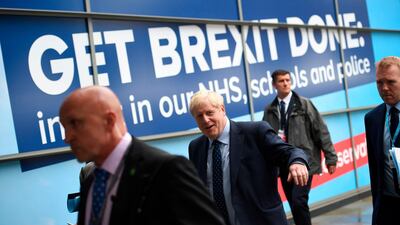These are tough times for global investors, as central bankers across the world scramble to cut interest rates to head off a potential recession.
There is little point in parking your money in cash, however, as near-zero interest rates have made this a losing strategy for the past decade.
If you are looking to invest $10,000 (Dh36,725) over the last quarter of this year, here are three options to consider. The first is relatively safe, the second could help save the planet and the third might be considered a wild and speculative gamble but it could prove a winner if you get your timing right.

Search for a safe haven in resurgent Japan
Sports lovers will have their eyes on Japan, as it becomes the first country in Asia to host the Rugby World Cup.
Next year, Tokyo stages the 2020 Olympic, and investors could benefit if the global exposure can revive the country's growth prospects.
Japan, the world’s third largest economy, is not immune to the global economy’s current uncertainty, with the Nikkei 225 falling 5 per cent in the last year as China's trade war with the US takes its toll across the region.
Kwok Chern-Yeh, manager of Aberdeen Japan Investment Trust, says the Rugby World Cup and the Olympic Games are coming at an opportune time as the country’s export-oriented economy has been hit by trade worries. “The tournaments will act as catalysts for tourism and boost consumption," he says. "We forecast an economic rebound by the spring and summer of 2020.”
Japan will increase its consumption tax from 8 to 10 per cent on October 1, and this could reduce spending and hit stock markets, but Mr Chern-Yeh says: “We would view a sell-off as an opportunity to buy quality companies at discounted prices.”
He adds that Japanese firms are in good financial health with robust balance sheets and sustainable cash flows. “Encouragingly, they are lifting shareholder returns in the form of dividends, in line with improving corporate governance standards.”
Japan has just struck a trade deal with the US to lower or eliminate tariffs on agricultural and digital goods.
Joshua Mahony, senior market analyst at online trading platform IG, says: “The US-Japan deal offers optimism that Trump could soon emerge with something similar from Chinese talks.”
Nicholas Price, manager of Fidelity Japan Trust, says the country's economy is stable, boosted by monetary easing from the Bank of Japan. "Japanese stocks continued to look undervalued,” he adds.
If tempted, Aberdeen Japan Investment Trust is up 65 per cent over five years, while Fidelity Japan Trust grew 117 per cent over the same period, according to Trustnet.com.
Alternatively, you could buy low-cost exchange traded funds (ETFs), such as iShares MSCI Japan (EWJ), up 67 per cent in five years, or iShares MSCI Japan Small Cap ETF (ISJP), up 44 per cent. Just remember that past performance is no guarantee of future returns.

Fight for a cleaner future by investing in green energy
The environment is at the top of the political agenda, as fires in the Amazon, plastic in the ocean and 16-year-old climate activist Greta Thunberg focuses minds on the problems afflicting our planet.
Dramatic changes will have to be made to drive down carbon emissions and investors can reap the benefit.
Vijay Valecha, chief investment officer at Century Financial, says the cost of clean energy is plunging, with unsubsidised solar photo voltaic power down 88 per cent from $359 per megawatt hour (Mwh) to $43/Mwh over the last nine years, while wind power costs fell 70 per cent from $135/Mwh to $42/Mwh. “Prices have declined so much that in parts of Europe and US, wind power is cheaper than fossil fuel or nuclear energy, and the trend looks set to continue.”
The difficult part has been making money from the sector, which like any emerging area, progresses through trial and error and innovative companies can have a high failure rate.
Investors are starting to see tangible rewards, for example, BlackRock Sustainable Energy Fund is up nearly 60 per cent in the last five years.
Mr Valecha says wind and solar look the most promising clean energy stocks, as companies can now thrive without subsidies.
He tips Invesco Solar ETF (TAN), which is down 22 per cent over five years, but is up 40 per cent over the last 12 months, which also serves as a reminder that the sector can be volatile.
He also rates iShares Global Clean Energy ETF (ICLN), the largest clean energy ETF in the US, and Greencoat UK Wind PLC (UKW). “Invesco Solar ETF and iShares Global Clean Energy ETF have rallied 75 per cent and 38 per cent respectively this year,” says Mr Valecha.

Turn Brexit to your advantage by investing in the UK
You need strong nerves to invest in a country as muddled as the UK has become over the EU, but there could be a massive opportunity if you get your timing right.
The pound has fallen sharply compared to most major global currencies, and this means your US dollar-linked dirhams stretch a lot further.
Mr Mahony says although Brexit has hit the UK economy and growth is sluggish, “we are still seeing it outperform the likes of Germany”.
Gaurav Kashyap, head of futures at currency traders EGM in Dubai, says the pound has recovered slightly in recent weeks, as markets calculate that a hard Brexit is still unlikely.
He says traders may wish to take advantage of future movements, because the pound could go in any direction from here — and sharply. At time of writing, it trades at around $1.22. If the UK crashes out of the EU without a deal, it could fall below $1.20, Mr Kashyap predicts.
Many will see that as an opportunity to buy UK assets such as stocks at a reduced price, provided you are able to hold on for the long-term and wait for any post-Brexit recovery to bed in.
If Brexit is delayed again, a surge of optimism could drive the pound above $1.28, Mr Kashyap says. “Perhaps the safest strategy in that case may be to short for the inevitable Brexit date in the future.”
Britons or residents with links to the country could use the volatility as an opportunity to send money to the UK. The UK was the fifth highest recipient of outward remittances from the UAE in the second quarter of this year, accounting for 3.8 per cent of total remittances, according to central bank data, as residents cash in on the falling pound amid Brexit turmoil.
You could track the fortunes of the stock market through funds such as iShares Core FTSE 100 ETF, or an actively managed fund such as Lindsell Train UK Equity, run by renowned fund managers Michael Lindsell and Nick Train, which has grown 100 per cent in the last five years.
Arran Summerhill, company director at Holo Mortgage Consultants, says your $10,000 could also go towards building up a deposit to buy a UK property, as annual house price growth has slowed to just 1 per cent a year, with prices falling in London.
A disruptive Brexit could be a real opportunity for property investors who can act fast to pick up a bargain. "Just remember, anything could happen in the months ahead," says Mr Summerhill.

